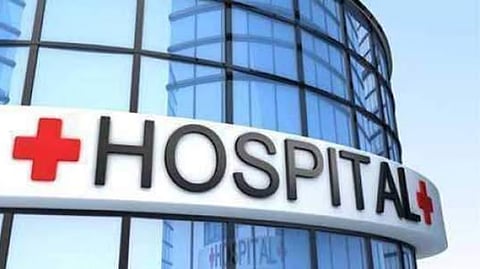

NEW DELHI: Hospitals with high footfall to install CCTV cameras in blind spots, security audits to be carried out with the District Collector and DSP, mock drills for security to be regularly conducted like safety drills for the fire and safety committee to be institutionalized and involve resident and junior doctors are among the string of security measures the centre on Wednesday asked the states to undertake to ensure enhanced security and safer working environment for healthcare workers.
Union Home Secretary Govind Mohan, who co-chaired the second meeting of the National Task Force (NGT) of chief secretaries and the Director General of Police (DGPs), with Union Health Secretary Apruva Chandra, also requested the officials to ensure that the 112 helpline number is integrated for health care workers; access control of large hospitals and the revamped position under Bharatiya Nyaya Sanhita (BNS) is shared with the healthcare workers.
Chandra encouraged the states to develop innovative ideas and emphasized some of the immediate measures that can be considered to enhance security and provide a safer working environment for healthcare workers.
He suggested that the states carry out a joint security audit with the District Collector and DSP. They should also review any shortfall in existing infrastructure and security arrangements and take remedial measures.
They were asked to carry out security checks of all hired security and other services staff regularly; State Security Corporation to provide security personnel; Control Room, especially in large set-ups, with duty roaster of staff that periodically monitor CCTV and securely store the data; distress call to be attended to by control rooms; and training of hired security personnel to upgrade their capacity as in many establishments they are observed to be found wanting in discharging their duties due to poor capacities.
Also, patient facilitators/trolley men/MTS in large hospitals to ferry patients on wheelchairs/stretchers are required to reduce the number of patient attendants and lessen the load and stress on security and other healthcare professionals.
The other suggested steps included capacity building and training doctors and other healthcare workers in bereavement protocols, especially in emergency/casualty wards, and institutionalizing a security and safety committee involving seniors.
Junior residents and students are to monitor the situation and status of emergency response preparedness continuously; routine security patrolling will be done on all the hospital/medical college premises during nighttime.
The meeting with the chief secretaries and DGPs came following the order of the Supreme Court on August 22 to ensure that specific basic minimum measures are put in place by the states pending the report of NTF, which was set up by the apex court to address the concerns of the doctors over their safety at their workplaces. The SC took suo moto cognizance of the nationwide protest by resident and junior doctors demanding justice for the 31-year-old trainee doctor who was brutally raped and murdered in a state-run hospital in Kolkata.
The meeting also came following a letter to all chief secretaries and DGPs on August 23 by the Union Health Secretary, which took cognizance of the rising violent incidents in medical institutions and the recent protest of resident doctors across the country following the alleged rape and murder of a woman doctor. The states were told to implement immediate security measures pending the NTF report and to discuss their implementation on August 28.
In the meeting, states apprised the centre about the various steps they have undertaken to enhance security and provide a safer working environment for healthcare workers across public and private hospitals, medical colleges, and other healthcare institutions.
Some of the immediate and short-term measures taken by the states included regular drills for handling security threats and episodes at hospitals with health care workers, on a similar line as fire safety drills; audit of spaces/rooms in hospitals and medical colleges to ensure undesirable elements do not misuse unutilized rooms/spaces; regulating the number of duty hours of resident doctors; security escorts for women doctors, Senior Residents etc., in some states during late night duty hours from hostel to place of work.
The other steps were proper implementation of state legislation, which is already in place in 26 states and UTs (Andhra Pradesh, Arunachal Pradesh, Assam, Bihar, Chhattisgarh, Delhi, Goa, Gujarat, Haryana, Himachal Pradesh, Jharkhand, Karnataka, Kerala, Madhya Pradesh, Maharashtra, Manipur, Odisha, Puducherry, Punjab, Rajasthan, Tamil Nadu, Tripura, Telangana, Uttar Pradesh, Uttarakhand and West Bengal) to safeguard healthcare professionals.
“States without similar Acts were urged to frame the required legislation,” officials said.
The states also informed that they have enhanced awareness through the display of provisions of BNS to protect health care professionals in hospital and medical college premises; have made provision of Chief Security Officers in Hospitals and Medical Colleges; carrying out police verification of contractual/ outsourced employees working in government hospitals; and conducting joint security audits at Government District Hospitals (DH) and Medical Colleges (MCs) by District Magistrates and Superintendent of Police along with Deans/Directors of DHs and MCs.
The states informed that police chowki/police are available on the premises of many large medical colleges/district hospitals and have increased patrolling by police at night.
Also, a sexual complaint/harassment committee to be in place and active and the CCTV network to be reviewed and further strengthened through additional CCTVs in hospital premises, especially covering dark zones, alleys, etc, were the other steps to be taken up by the states.